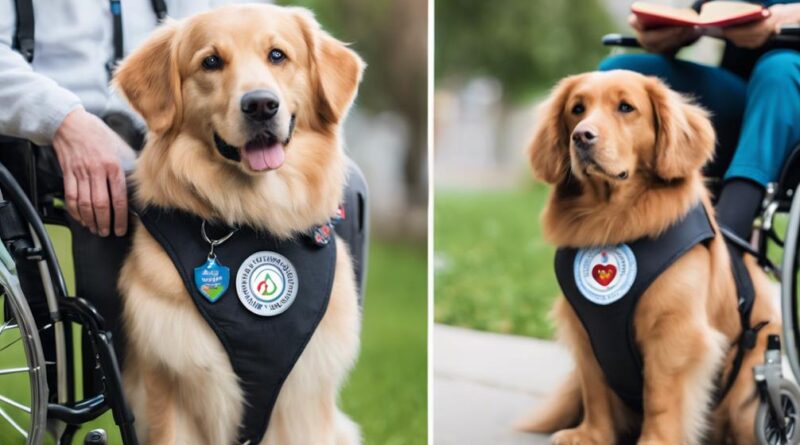Why Are Therapy Dog Laws and Qualifications Essential?
Did you know that in the United States, there are over 50,000 therapy dog teams bringing comfort and support to people in need each year?
Understanding the importance of therapy dog laws and qualifications goes beyond just the number of teams out there.
It's about ensuring safety, setting standards, and upholding the integrity of the therapy dog role.
So, what exactly do these laws and qualifications entail, and why are they crucial for both the dogs and the individuals they serve?
Importance of Therapy Dog Laws
Understanding the importance of therapy dog laws is crucial for ensuring the well-being of both the therapy dogs and the individuals they serve. When it comes to ethical considerations, these laws are designed to protect the welfare of therapy dogs, ensuring they aren't put in situations that could cause them harm or distress. By setting guidelines for how therapy dogs should be treated and the environments they should work in, these laws aim to uphold the highest standards of care for these special animals.
Licensing requirements are another vital aspect regulated by therapy dog laws. These requirements ensure that therapy dogs are properly trained, vaccinated, and evaluated for their suitability to work in therapy settings. Licensing also helps to hold owners accountable for their dogs' behavior and care. It's essential to have these regulations in place to maintain the integrity of therapy dog programs and to safeguard the well-being of those who interact with therapy dogs.
Qualifications for Therapy Dogs
Therapy dog qualifications play a crucial role in ensuring that these animals are well-prepared and suitable for their important roles in providing therapy. When considering a dog for therapy work, it's essential to look for specific qualities and certifications that indicate they're capable of offering emotional support to those in need.
Here are some key qualifications to assess when evaluating a dog for therapy work:
- Temperament: A therapy dog should have a calm and gentle temperament, being friendly and at ease in various environments and around different people. This is crucial for their role in providing comfort and support during therapy sessions.
- Training: Proper training is vital for therapy dogs to ensure they can follow commands reliably and behave appropriately in all situations. Training also helps them understand how to interact safely and positively with individuals during pet therapy sessions.
- Health and Vaccinations: Before becoming a therapy dog, it's important for the animal to be up to date on all vaccinations and in good health. This ensures the safety of both the dog and the individuals they'll be providing therapy to.
Benefits of Regulation Compliance
Compliance with regulations brings about numerous benefits for those involved in therapy dog programs. By adhering to established guidelines, you not only enhance public perception but also uphold essential ethical considerations. When therapy dog teams follow regulations, it demonstrates a commitment to professionalism and integrity, which can positively influence how the public views the program. Moreover, by ensuring that therapy dogs and their handlers meet specific qualifications, you contribute to maintaining high standards of care and safety for everyone involved.
Enforcement challenges are minimized when regulations are followed diligently. Clear guidelines make it easier for authorities to monitor and enforce compliance uniformly. This streamlined process helps prevent misunderstandings and ensures that all therapy dog teams operate on a level playing field. Additionally, by complying with regulations, you avoid potential legal implications that may arise from non-compliance. Following the established rules not only safeguards the well-being of therapy dogs but also protects handlers and the institutions they visit from potential liabilities.
Impact on Public Safety
Adhering to therapy dog regulations not only ensures program integrity but also plays a crucial role in maintaining public safety. When therapy dog laws and qualifications are respected, the impact on public safety is significant. Here's how it affects various aspects:
- Public Perception: Following therapy dog regulations helps to enhance public perception. When therapy dogs are properly trained and certified, the community has more trust in the program. This trust leads to increased acceptance and support for therapy dog initiatives.
- Community Engagement: By adhering to therapy dog laws and qualifications, you contribute to fostering positive community engagement. When therapy dogs and their handlers meet the required standards, it promotes a sense of safety and professionalism within the community. This, in turn, encourages more active participation and engagement in therapy dog activities.
- Safety Measures: Upholding therapy dog regulations is a crucial safety measure. Properly trained therapy dogs are less likely to pose risks to public safety. By ensuring that therapy dogs meet specific qualifications, you help prevent incidents that could compromise the well-being of both the handlers and the community they serve.
Respecting therapy dog laws and qualifications not only benefits the program but also has a direct impact on public safety, public perception, and community engagement.
Liability Concerns Addressed
To address liability concerns effectively, ensure that all handlers understand their responsibilities regarding the therapy dog program. Providing clear guidelines and training on liability protection and risk management is crucial for the safety of all involved. By educating handlers on potential risks and how to mitigate them, you can reduce the likelihood of incidents that could lead to liability issues.
Liability protection is essential in any therapy dog program. Make sure that handlers are informed about their responsibilities and the potential risks involved in interacting with individuals. Encourage them to always prioritize safety and follow proper protocols to minimize the chances of accidents occurring. Additionally, having appropriate insurance coverage can provide an extra layer of protection in case of unforeseen circumstances.
Effective risk management strategies can help prevent liability issues from arising. Handlers should be trained to assess environments for potential hazards and to make informed decisions to ensure the safety of everyone involved. By proactively addressing risks and taking necessary precautions, handlers can create a safer and more secure environment for therapy dog interactions.
Training Standards and Requirements
To ensure the effectiveness of your therapy dog program, understanding and meeting the training standards and requirements is vital. When it comes to training standards, there are specific criteria that need to be met to ensure your therapy dog is well-prepared for their role.
- Behavioral Training: Your therapy dog should undergo behavioral training to ensure they can remain calm and well-behaved in various environments.
- Socialization Skills: It's essential for therapy dogs to be comfortable and friendly around different people, including those with disabilities or in stressful situations.
- Certification Process: Understanding the certification process is crucial. This process typically involves evaluations to assess your dog's temperament, obedience, and suitability for therapy work.
Meeting these training standards and going through the certification process won't only benefit the recipients of your therapy dog's services but also ensure the safety and well-being of your dog. By investing time and effort into proper training, you can enhance the positive impact your therapy dog has on those in need.
Ensuring Proper Animal Welfare

Ensuring the well-being of your therapy dog is paramount in maintaining the integrity of your program. Proper animal welfare practices aren't only ethical considerations but also crucial for the effectiveness of therapy dog interactions. As a therapy dog handler, you hold the responsibility to guarantee that your furry companion is physically and emotionally cared for.
To ensure animal welfare, it's essential to prioritize your therapy dog's health. Regular veterinary check-ups, vaccinations, and a nutritious diet are fundamental aspects of maintaining your dog's well-being. Additionally, providing opportunities for exercise, mental stimulation, and adequate rest are vital for their overall welfare.
Ethical considerations play a significant role in the proper treatment of therapy dogs. It's crucial to respect your dog's boundaries and not push them beyond their comfort levels during therapy sessions. Always monitor their behavior for signs of stress or fatigue, and be prepared to remove them from any situation that may cause distress.
Remember that your therapy dog isn't only a tool for therapy but a living being that deserves love, care, and respect. By upholding high standards of animal welfare and ethical conduct, you contribute to the positive impact therapy dogs can have on those they interact with.
Role in Healthcare Settings
When in healthcare settings, your therapy dog plays a crucial role in providing comfort and support to patients. Here's how your furry companion contributes to the well-being of individuals in these environments:
- Patient Comfort: Your therapy dog helps create a soothing and calming atmosphere for patients, offering a sense of familiarity and warmth in an otherwise clinical setting. The presence of a friendly and non-judgmental animal can significantly improve the overall comfort levels of those receiving medical care.
- Emotional Support: Through their gentle demeanor and unconditional love, therapy dogs have a remarkable ability to uplift spirits and provide emotional support to patients facing challenging circumstances. Interactions with these dogs can reduce feelings of loneliness, anxiety, and stress, promoting a more positive outlook during difficult times.
- Enhancing Communication: Therapy dogs can act as a catalyst for communication between healthcare providers and patients. Their presence often helps break down barriers and encourages conversation, making it easier for individuals to express their feelings and concerns. This improved communication can lead to better outcomes and a more positive healthcare experience for patients.
Frequently Asked Questions
Are Therapy Dogs Required to Undergo Regular Health and Temperament Evaluations?
Yes, therapy dogs need to undergo regular health and temperament evaluations. These assessments ensure that they're fit for their important role.
In addition to these evaluations, therapy dogs are also required to meet specific training requirements to provide the best support to those in need.
How Do Therapy Dog Laws Vary Between Different States or Countries?
Therapy dog laws differ internationally. In some places, training requirements may vary, impacting where and how therapy dogs can work.
It's crucial to research these differences if you plan to travel with your therapy dog. Understanding the regulations in different states or countries can ensure that you comply with local laws and can continue providing support through your therapy dog.
Can Therapy Dogs Be Used in Schools or Educational Settings?
Therapy dogs can definitely be used in schools or educational settings. They offer various benefits in the classroom, such as reducing stress and anxiety, improving focus, and promoting a positive environment for learning.
Student interaction with therapy dogs can also enhance social skills and emotional well-being. These furry companions can make a significant impact on students' overall experience and academic performance.
Are There Specific Regulations for Therapy Dog Handlers or Owners?
When it comes to therapy dog regulations, there are specific guidelines for handler training and owner responsibilities. These rules ensure that handlers are properly equipped to manage therapy dogs in various environments, including schools.
Owners must also uphold certain standards to guarantee the well-being and behavior of their therapy dogs. By adhering to these regulations, therapy dog teams can provide effective support and comfort in educational settings.
What Are the Consequences for Individuals or Organizations That Violate Therapy Dog Laws or Regulations?
If you violate therapy dog laws or regulations, legal repercussions can be severe. Enforcement mechanisms include fines, penalties, or even legal action. Organizations and individuals must comply with these rules to ensure the safety and effectiveness of therapy dog programs.
Conclusion
In conclusion, therapy dog laws and qualifications are essential for ensuring the safety and well-being of both animals and the public. By establishing regulations and standards, we can guarantee that therapy dogs are properly trained, certified, and equipped to provide the necessary support in various settings. Compliance with these laws not only enhances public safety but also addresses liability concerns and promotes the highest level of animal welfare.
It's crucial to prioritize these regulations for the benefit of all involved.
